Vegan restaurants, suddenly attracting trendy designers, world-class chefs and mainstream diners, are not what they used to be.
By Roger Grady
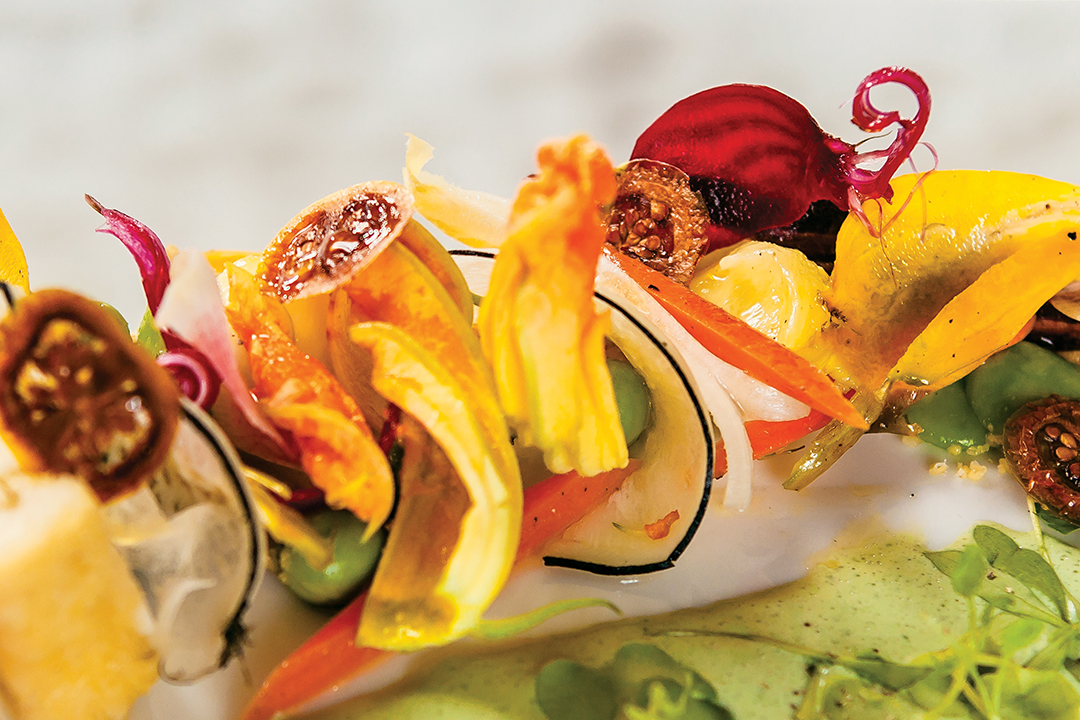
Macadamia cheese crumble with tarragon-spirulina sauce, squash blossom and black radish; Elizabeth’s Gone Raw; photo © Foster Wiley
The current wave of steakhouses, Korean barbecue restaurants and Brazilian churrascarias suggests Americans are unapologetically embracing their carnivorous cravings. Also flourishing, however, are vegan restaurants that shatter stereotypes of funky holes-in-the-wall accommodating struggling philosophers with tasteless sprouts. A new generation of vegan restaurants offers sophisticated, even elegant experiences with surprisingly little deprivation.
A vegan diet — the more politically correct term is “plant-based” cuisine — utilizes no animal products whatsoever, making it more restrictive than vegetarianism, and therefore stigmatized by those who assume such orthodoxy stifles creativity. But plant-based kitchens are suddenly attracting chefs that take their craft seriously, people trained in top culinary schools and Michelin-starred kitchens. Their customers are not exclusively herbivores, but mainstream diners simply seeking a change of pace, no different than going out for Thai or Peruvian food.
The Los Angeles diner is often typecast as a supermodel picking at her salad, so it is no surprise the city has its share of vegan establishments. But no restaurant in L.A. provides a better example of an imaginative chef elevating plant-based cuisine than Crossroads, where chef/owner Tal Ronnen turns out exquisitely plated dishes in a dining room with white linen-clad tables, trendy chandeliers and high-end finishes. “We wanted to create a dining experience that was comfortable and a little more refined than what most people think a vegan restaurant experience is all about,” says Ronnen.
“What we try to do at Crossroads is provide an experience that doesn’t feel like a sacrifice, but is actually a step up,” says Ronnen. The author of The Conscious Cook explains that the challenge of finding creative, vegan alternatives to traditional sauces like hollandaise or béarnaise is very exciting to him as a chef.
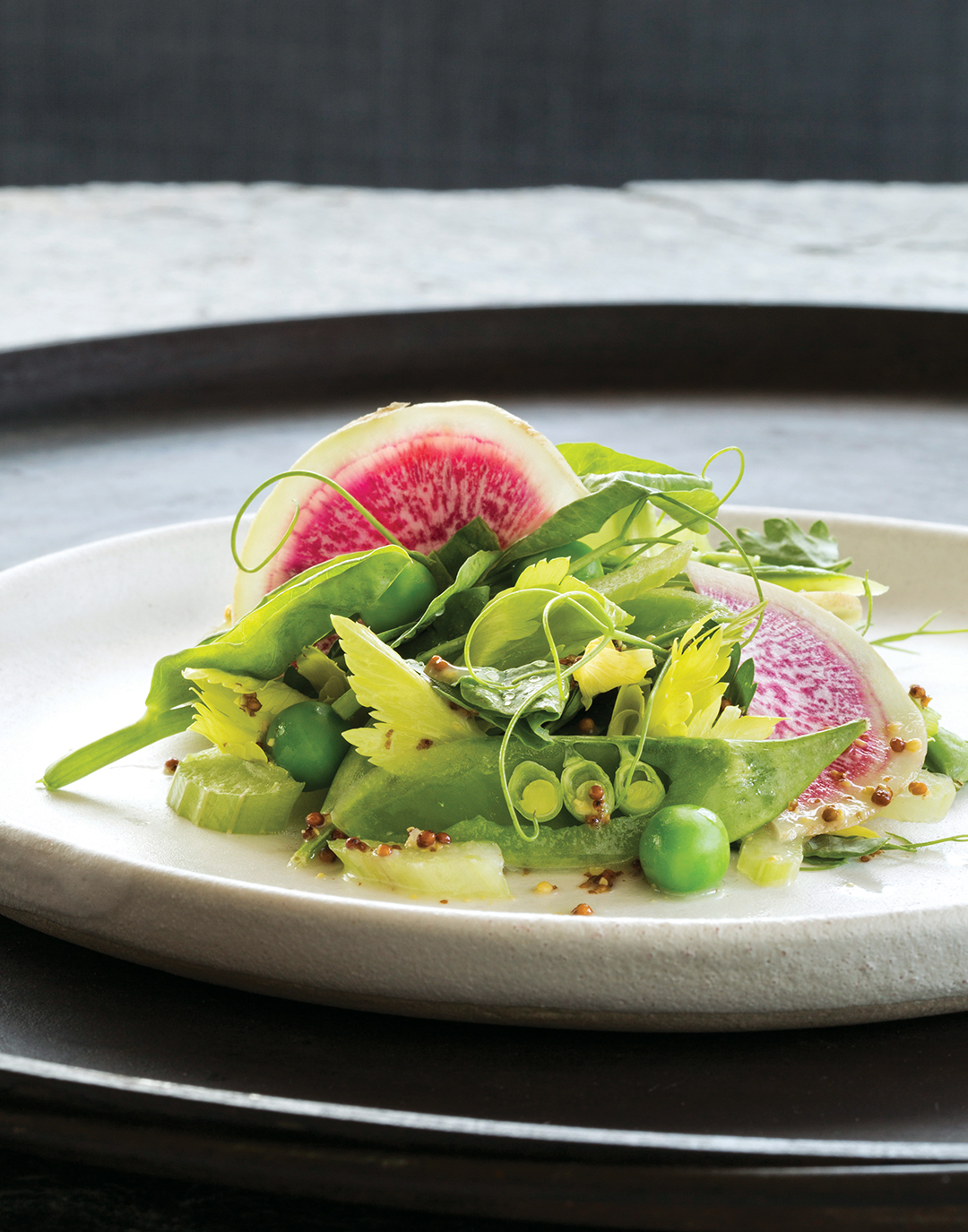
Spring chopped salad with whole-grain-mustard vinaigrette; Photo courtesy Crossroads
At Crossroads, the seasonally changing menu may include vichyssoise or tomato-watermelon gazpacho, pizza with truffle “cream” sauce, grilled vegetable lasagna, and even a cheese plate showcasing Kite Hill artisanal vegan cheeses. In the fall, a “seafood” tower is offered, with carrot “lox” standing in for smoked salmon with kelp caviar and almond milk “crème fraîche,” while tempura-battered lobster mushrooms suggest something far more indulgent.
Longtime Washington, D.C., caterer Elizabeth Petty turned to a raw vegan diet when she was recovering from breast cancer, but faced a pivotal dilemma regarding her career. “I lived and breathed food, so I knew I could take raw vegan cuisine to a level nobody had ever seen,” she recounts, and founded Elizabeth’s Gone Raw rather than abandoning her passion. The restaurant, occupying a sumptuously furnished 19th century Federalist-era townhouse not far from the White House, is the antithesis of the stereotypical countercultural vegan hole-in-the-wall.
Petty is passionate about the various benefits of maintaining a raw vegan diet, but retains a commitment to culinary sophistication and creativity, which executive chef Francisco Hernandez presents in exquisite seven-course meals every Friday evening. With artfully plated dishes like a silky red pepper soup with lavender-cabbage foam or a mushroom roulade with black truffle, salsa verde, yuzu and almond buttermilk cream, it is no wonder foodies of all stripes have discovered this highly personalized, heartfelt restaurant. Hardly a zealot — she occasionally cooks meat for her own family — Petty reports, “I’m not only happy to be alive but am so grateful people have embraced this cuisine and continue to express their
appreciation.”
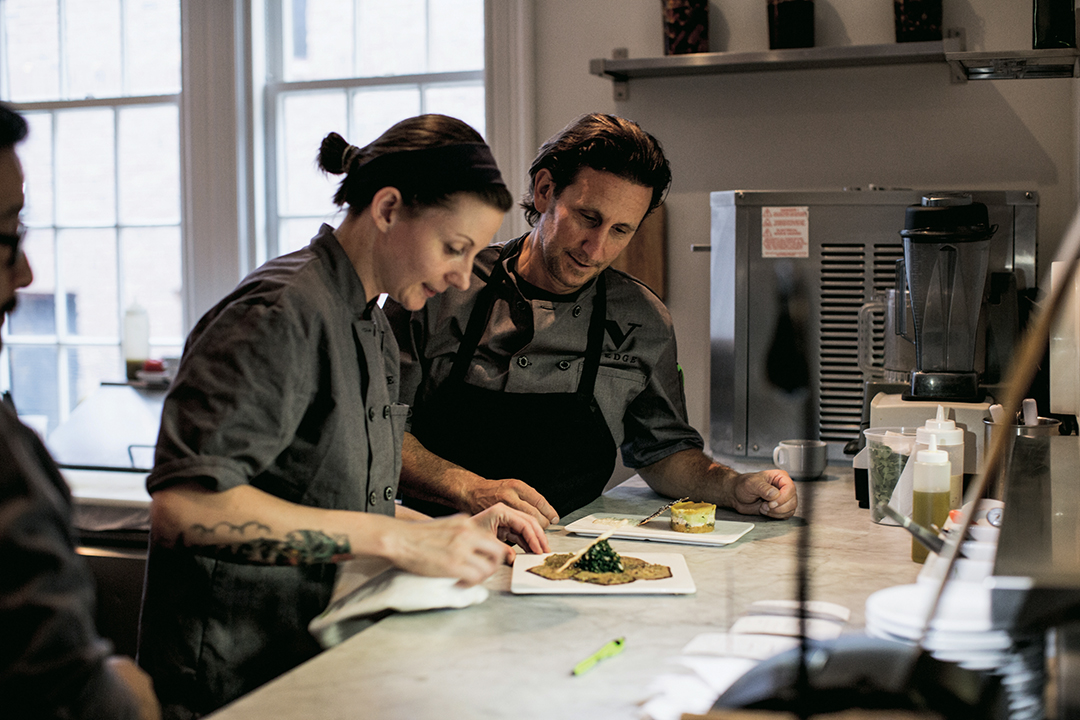
Rich Landau, executive chef/co-owner, and Valarie McCarro, kitchen manager; Photo courtesy Vedge.
In 1994, chef Richard Landau opened a humble food counter inside a natural food store, eventually marrying one of his customers, Kate Jacoby. Today the couple operates Vedge, ensconced in a historic brownstone in downtown Philadelphia, and both have earned James Beard Award nominations for their refined veggie-centric cooking. From a kitchen devoid of animal products comes an avocado stuffed with turmeric-tinted cauliflower or a playful riff on the city’s iconic Philly cheesesteak sandwich: house-made potato bread stuffed with maitake mushrooms in a “cheesy” sauce of roasted rutabaga. The all-natural wine list is nationally recognized, and pastry chef Jacoby creates a pretzel-crusted chocolate-peanut butter finale that is downright decadent.
Although Jacoby never proselytizes customers — most of them are foodies, but not full-time vegans — she states, “There’s such a strong argument for health and environmental impact in choosing a vegan lifestyle.” The couple’s second restaurant, V Street, offers a more casual vegan experience. “V Street is more fun, more daring and spicier, inspired by street foods from around the world,” reports Jacoby.
When he is not working as a private celebrity chef, keynote speaker or consultant, Matthew Kenney oversees restaurants in his native Maine, Miami, L.A., and New York City, with another opening in the Persian Gulf state of Bahrain next year. The Miami location of Plant Food + Wine, designed by renowned architect Rene Gonzalez, features a gorgeous palm-studded wooden deck surrounding a seductively illuminated reflecting pool. “Our cuisine is modern, clean and organic, and we create environments to fit this vision,” explains Kenney.
“Cooking plant-based has challenged me to look at ingredients in a new way,” explains Kenney. Meats may be off limits at Plant Food + Wine, but a mushroom pâté can provide the illusion of something much richer, while watermelon poke, coconut ceviche tacos and kimchi dumplings populate a globally inspired menu. A five-course tasting menu with optional wine pairings is offered, and desserts range from vegan tiramisu to strawberry-hibiscus cheesecake.
Culinary diversity for vegans is provided at San Francisco’s Gracias Madre, whose Mexican-themed menu offers gorditas with salsa verde, avocado and cashew crema, and vegan tamales. Beyond Sushi, a New York vegan mini-chain from classically trained, Israeli-born chef Guy Vaknin, dispenses eye-popping black rice sushi with curried cauliflower and almond pesto, or a spicy mango roll topped with toasted cayenne sauce.
“I always wanted to create beautiful, nutritious food and deliver fantastic culinary experiences,” reports Kenney, a sentiment that could be attributed to any passionate chef, not just an advocate of plant-based cuisine.
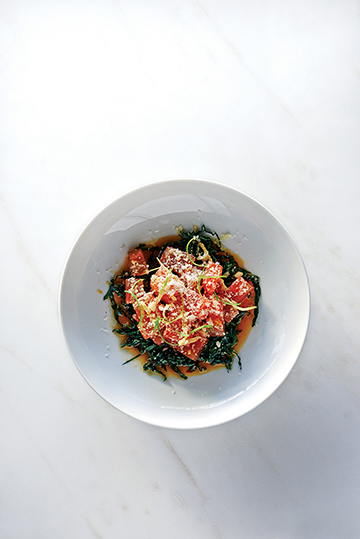
Wood Roasted Carroy by Vedge
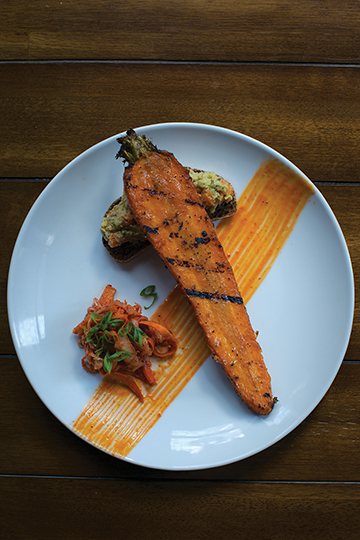
Watermelon Poke by Plant Food + Wine
Guiltless Indulgence
Beyond Sushi 229 E. 14th St., New York City, 646.861.2889 (and two other locations); www.beyondsushinyc.com
Crossroads 8284 Melrose Ave., Los Angeles, 323.782.9245; www.crossroadskitchen.com
Elizabeth’s Gone Raw 1341 L St. NW, Washington, D.C., 202.347.8349; www.elizabethsgoneraw.com
Gracias Madre 2211 Mission St., San Francisco, 415.683.1346; www.gracias-madre.com
Plant Food + Wine 1009 Abbot Kinney Blvd., Venice, California, 310.450.1009; 105 NE 24th St., Miami, 305.814.5365; www.matthewkenneycuisine.com
Vedge 1221 Locust St., Philadelphia, 215.320.7500; www.vedgerestaurant.com
V Street 126 S. 19th St., Philadelphia, 215.278.7943; www.vstreetfood.com


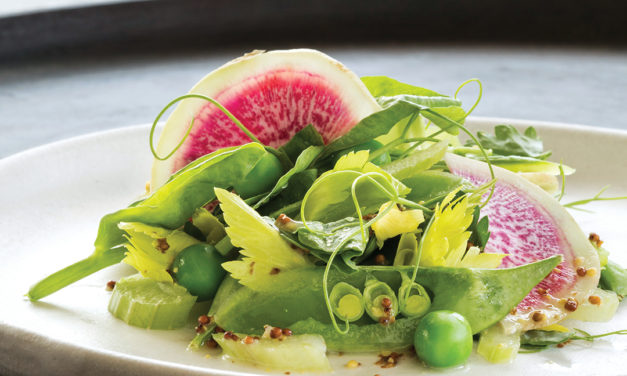
Leave a Reply